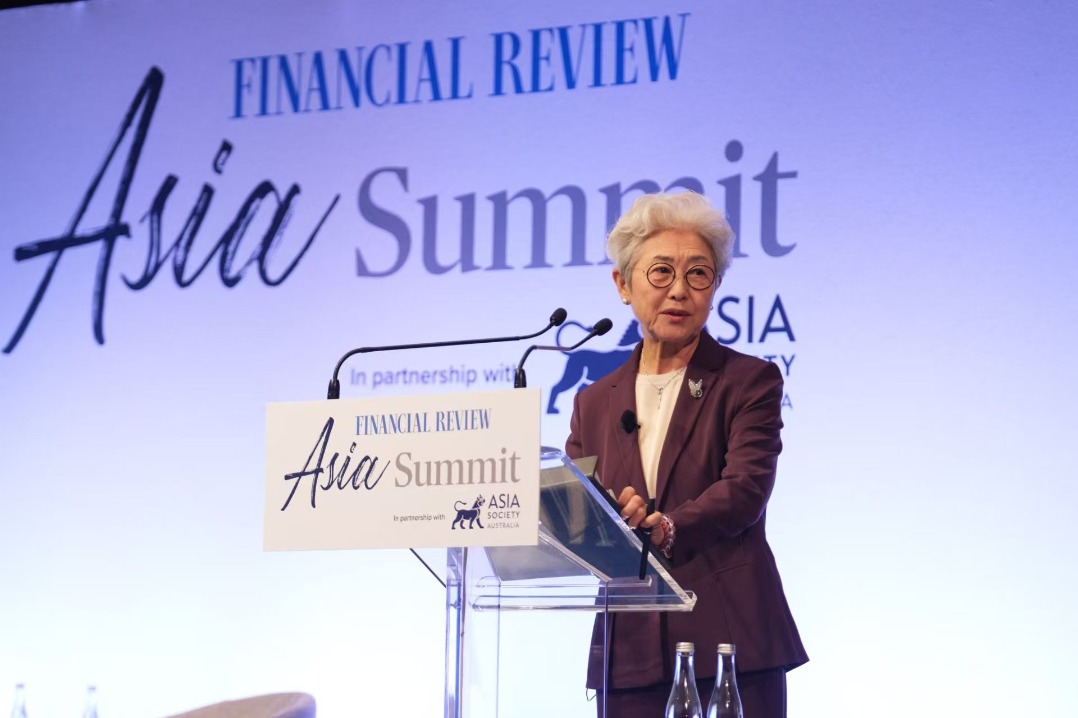Beyond bilateral
Indonesia joining BRICS will further strengthen not only cooperation with China but also that with the rest of the Global South


Editor's note: The world has undergone many changes and shocks in recent years. Enhanced dialogue between scholars from China and overseas is needed to build mutual understanding on many problems the world faces. For this purpose, the China Watch Institute of China Daily and the National Institute for Global Strategy, Chinese Academy of Social Sciences, jointly present this special column: The Global Strategic Dialogue, in which experts from China and abroad will offer insightful views, analysis and fresh perspectives on long-term strategic issues of global importance.
Brazil, as this year's BRICS chair, announced in January that Indonesia had been accepted as the member of the group. This marks a remarkably swift process. It is therefore worth revisiting the implications of Indonesia's BRICS membership for Indonesia-China relations.
For the record, Indonesia-China ties had already reached an unprecedented peak before Indonesia joined BRICS. Since 2013, when President Xi Jinping proposed building the 21st Century Maritime Silk Road in Jakarta and China have maintained a comprehensive strategic partnership status with Indonesia, the country is becoming a supportive partner in China's global initiatives and proposals, including its community with a shared future for humanity. Now, with Indonesia's BRICS membership, there are four positive spillover impacts worth discussing.
First, the two countries will have more opportunities to communicate and exchange ideas through BRICS meetings, given their status as long-standing beneficiaries of an open and multilateral world. If we imagine these interactions as a "noodle bowl", the more Indonesia and China engage, the richer their cooperation becomes amid an increasingly unstable international environment. In November 2024, Indonesia and China agreed to hold the first meeting of the 2+2 Dialogue Mechanism for Foreign Ministers and Defense Ministers in 2025. While their ministers have met via various platforms such as the Association of Southeast Asian Nations, G20, Asia-Pacific Economic Cooperation, and Regional Comprehensive Economic Partnership, BRICS — with an annual summit and many other meetings — offers Indonesia additional avenues for building rapport between these two countries.
Second, the two countries will likely become more familiar with each other's development practices in emerging fields. Indonesia welcomes China-led capacity-building initiatives through BRICS platforms such as the China-BRICS Artificial Intelligence Development and Cooperation Center, the BRICS Deep-Sea Resource International Research Center, and the China Center for Cooperation on Development of Special Economic Zones in BRICS Countries. Increased exposure to these initiatives may enhance Indonesian familiarity with Chinese approaches. While not all Chinese practices will be fully compatible with Indonesia's interests and needs, greater knowledge of them can help Indonesia provide constructive feedback and synergize with them for the common good. Interoperability between Chinese and Indonesian standards could become something feasible if Indonesia later considers joining the BRICS Excellence Center for Smart Customs or the BRICS Digital Ecosystem Cooperation Network.
Third, the two countries will likely broaden the horizon of their partnership. Indonesia-China cooperative activities are many, but most are concentrated within the greater Asia-Pacific region. With Indonesia joining BRICS — and with the Prabowo Subianto administration prioritizing engagement beyond the region — both countries could explore new public goods initiatives for other parts of the world, particularly Africa. China already has the Forum on China-Africa Cooperation, while Indonesia has the Indonesia-Africa Forum. These platforms could be leveraged to introduce best practices from the Asia-Pacific region, such as the ASEAN+3 Emergency Rice Reserve or the Chiang Mai Initiative for formal currency swap agreements. Nevertheless, expanding engagements beyond Asia must not come at the expense of the long-standing commitment to ASEAN and its related mechanisms. Instead, Indonesia and China should brief ASEAN members and ASEAN+3 partners on the progress of global public goods provision within BRICS, ensuring synergy with their programs where possible. Ultimately, BRICS must remain inclusive and non-confrontational.
Fourth, Indonesia and China will have the opportunity to consolidate their supply chains. Not all materials or industries need to be monopolized by both of the countries; rather, BRICS membership allows for diversification by integrating partners such as Brazil or South Africa into supply chains and industrial parks. A broader, more integrated supply chain increases resilience against geopolitical disruptions. For instance, Indonesia, Brazil and China — with their combined industrial capacities — could translate the outcomes of the BRICS Agricultural Research Platform into climate-resilient food products using Brazilian soybeans, Indonesian coffee or Chinese rice. This may contribute to the overall food security among the BRICS members.
The positive spillovers of Indonesia's BRICS membership must not stop at the bilateral level, it must also boost the South-South cooperation. Redefining the Bandung Principles to address pressing issues faced by Global South countries must be a primary focus as the world commemorates the 70th anniversary of the Asian-African Conference this year. For example, Indonesia and China could work together to translate the Bandung Principles into norms related to deep-sea research or AI. Enhancing complementarity among emerging providers within BRICS will help avoid redundancy, ensuring that each member focuses on its comparative advantage in assisting fellow Global South nations. Aligning BRICS mechanisms with international standards that offer universal benefits, such as good governance, open economies, climate change mitigation and human rights protection, will be crucial. Ensuring that BRICS remains empathetic toward the needs of Global South countries, rather than applying a blanket cooperation approach or power-based ownership structures, is also essential.
To conclude, Indonesia's BRICS membership opens a new chapter in its diplomatic and economic engagements, particularly with China. If leveraged strategically, it can enhance not only bilateral relations but also broader South-South cooperation. It is in everyone's interest that BRICS does not replace existing platforms that benefit the Global South, including the North-South triangular partnerships. Instead, it should focus on carving out a niche in areas where traditional Northern partners may be unwilling or unable to engage due to structural differences or competing priorities.


The author is a researcher at the Department of International Relations at the Centre for Strategic and International Studies, Indonesia. The author contributed this article to China Watch, a think tank powered by China Daily.
Contact the editor at editor@chinawatch.cn.


































